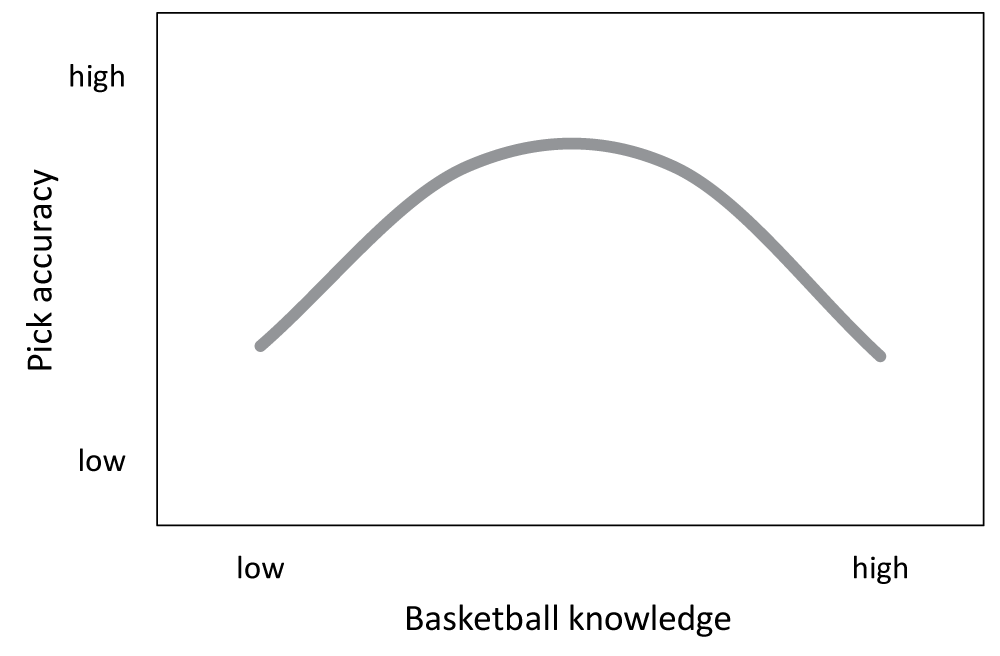It’s sometimes said that a little knowledge is a dangerous thing. Arguably, too much knowledge is equally bad. Indeed, Einstein is quoted as saying:
A little knowledge is a dangerous thing. So is a lot.
I don’t suppose Einstein had gambling in mind, but still…
March Madness pools are a popular form of betting in the United States. They are based on the playoff tournament for NCAA college basketball, held annually every March, and comprise a so-called bracket bet. Prior to the tournament start, a player predicts the winners of each game from the round-of-sixteen right through to the final. This is possible since teams are seeded, as in tennis, so match pairings for future rounds are determined automatically once the winners from previous rounds are known. In practice, it’s equivalent to picking winners from the round-of-sixteen onwards in the World Cup.
There are different scoring systems for judging success in bracket picks, often with more weight given to correct outcomes in the later rounds, but in essence the more correct outcomes a gambler predicts, the better their score. And the player with the best score within a pool of players wins the prize.
Naturally, you’d expect players with some knowledge of the differing strength of the teams involved in the March Madness playoffs to do better than those with no knowledge at all. But is it the case that the more knowledge a player has, the more successful they’re likely to be? In other words:
To what extent is success in the March Madness pools determined by a player’s basketball knowledge?
This question was explored in a recent academic study discussed here. In summary, participants were given a 25-question basketball quiz, the results of which were used to determine their level of basketball knowledge. Next, they were asked to make their bracket picks for the March Madness. A comparison was then made between accuracy of bracket picks and level of basketball knowledge.
The results are summarised in the following graph, which shows the average relationship between pick accuracy and basketball knowledge:

As you’d expect, the players with low knowledge do relatively badly. Then, as a player’s basketball knowledge increases, so does their pick accuracy. But only up to a point. After a certain point, as a player’s knowledge increases, their pick accuracy was found to decrease. Indeed, the players with the most basketball knowledge were found to perform slightly worse than those with the least knowledge!
Why should this be?
The most likely explanation is as follows…
Consider an average team, who have recently had a few great results. It’s possible that these great results are due to skill, but it’s also plausible that the team has just been a bit lucky. The player with expert knowledge is likely to know about these recent results, and make their picks accordingly. The player with medium knowledge will simply know that this is an average team, and also bet accordingly. While the player with very little knowledge is likely to treat the team randomly.
Random betting due to lack of knowledge is obviously not a great strategy. However, making picks that are driven primarily by recent results can be even worse, and the evidence suggests that’s exactly what most highly knowledgable players do. And it turns out to be better to have just a medium knowledge of the game, so that you’d have a rough idea of the relative rankings of the different teams, without being overly influenced by recent results.
Now, obviously, someone with expert knowledge of the game, but who also knows how to exploit that knowledge for making predictions, is likely to do best of all. And that, of course, is the way sports betting companies operate, combining expert sports knowledge with statistical support to exploit and implement that knowledge. But the study here shows that, in the absence of that explicit statistical support, the player with a medium level of knowledge is likely to do better than players with too little or too much knowledge.
In some ways this post complements the earlier post ‘The benefit of foresight’. The theme of that post was that successful gambling cannot rely solely on Statistics, but also needs the input of expert sports knowledge. This one says that expert knowledge, in isolation, is also insufficient, and needs to be used in tandem with statistical expertise for a successful trading strategy.
In the specific context of betting on the NCAA March Madness bracket, the argument is developed fully in this book. The argument, though, is valid much more widely across all sports and betting regimes, and emphasises the importance to a sports betting company of both statistical and sport expertise.
Update (21/3): The NCAA tournament actually starts today. In case you’re interested, here’s Barack Obama’s bracket pick. Maybe see if you can do better than the ex-President of the United States…

